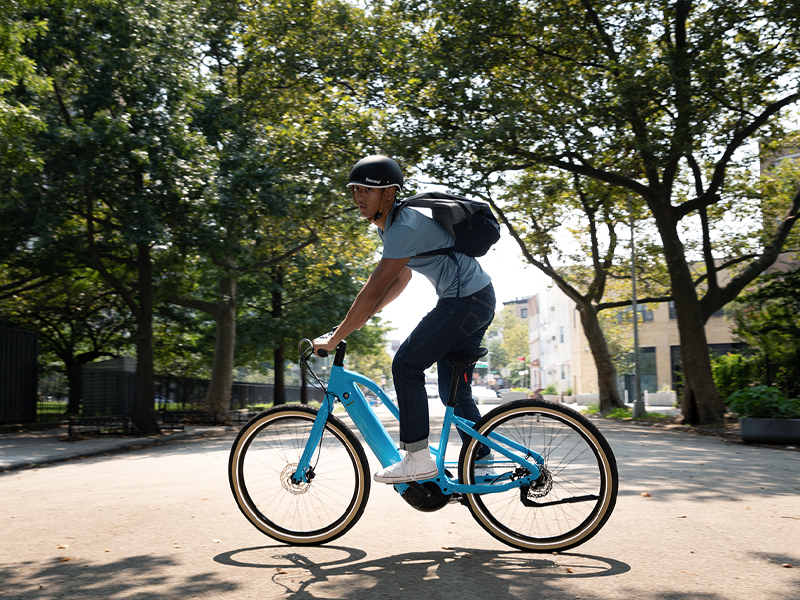About Sustainable Cycling Accessorie
The cycling industry, while inherently greener than many other sectors, still contributes to environmental degradation through resource-intensive manufacturing and non-recyclable materials. Sustainable cycling accessories address these issues by using recycled, biodegradable, or renewable materials and minimizing waste during production. For eco-conscious riders, these accessories not only enhance their riding experience but also reflect their values of environmental stewardship.
Environmental Impact of Traditional Cycling Gear
Traditional cycling accessories, such as helmets, clothing, and bags, often rely on synthetic materials like virgin polyester, nylon, and plastic, which have significant environmental costs. The production of these materials consumes energy, emits greenhouse gases, and contributes to microplastic pollution. Additionally, many accessories are not designed for end-of-life recycling, leading to landfill waste. Sustainable cycling accessories aim to mitigate these impacts by prioritizing low-impact materials and production processes.

Benefits of Choosing Sustainable Accessories
Eco-conscious riders benefit from sustainable cycling accessories in multiple ways. These products often use recycled or natural fibers, reducing the demand for virgin resources. They are frequently produced under fair labor conditions, supporting ethical supply chains. Moreover, sustainable accessories are often designed for durability and recyclability, extending their lifecycle and reducing waste. By choosing these products, riders contribute to a circular economy, where materials are reused and repurposed rather than discarded.
Top Sustainable Cycling Accessories for Eco-Conscious Riders
A growing number of brands are innovating to create sustainable cycling accessories that meet the needs of eco-conscious riders. Below, we explore some of the best options available, from helmets to clothing to bike bags, all designed with sustainability in mind.
Eco-Friendly Helmets
Helmets are essential for cyclist safety, but traditional models often use expanded polystyrene (EPS) foam, which is difficult to recycle. Sustainable alternatives are emerging, offering eco-conscious riders safer and greener options.
Cardboard-Based Helmets
One innovative example is the Ecolution helmet by Abus, which uses recycled cardboard in a honeycomb design. This helmet is 15% lighter than traditional EPS helmets and offers superior impact absorption. While still a niche product, it represents a step toward sustainable cycling accessories that reduce reliance on non-recyclable materials.
Biodegradable Flax Resin Helmets
Designer James Dart is developing biodegradable helmets made from flax resin, a renewable material that decomposes naturally at the end of its life. These helmets maintain high safety standards while offering a sustainable alternative to plastic-based designs. Such innovations are crucial for eco-conscious riders looking to minimize their environmental impact.
Sustainable Cycling Clothing
Cycling apparel is another area where sustainability is gaining traction. Brands are using recycled and natural materials to create jerseys, bib shorts, and base layers that perform well and align with eco-conscious values.
Recycled Polyester and Nylon Apparel
UK-based brand Presca, founded in 2013, produces cycling clothing using recycled polyester from plastic bottles and recycled nylon from fishing nets and carpets. Their Grand Tour Jersey, for instance, is made with 100% renewable energy and packaged in home-compostable materials. Presca’s website even details the environmental savings of each garment, such as the number of plastic bottles repurposed or days of drinking water saved. This transparency empowers eco-conscious riders to make informed choices.
Merino Wool Base Layers
Merino wool is a natural, biodegradable fiber that is gaining popularity in sustainable cycling accessories. Dutch brand Futurum, launched in 2012, uses 98% merino wool in its base layers, which break down naturally at the end of their lifecycle. Futurum also avoids plastic packaging, opting for cardboard tubes to reduce waste. Their commitment to local production in Italy and Portugal further minimizes transportation emissions, making their products a favorite among eco-conscious riders.
Eco-Conscious Bike Bags and Panniers
Bike bags and panniers are essential for commuters and touring cyclists, and sustainable options are now available to meet the needs of eco-conscious riders.
Recycled Material Bike Bags
Brands like Ortlieb and Vaude offer panniers and saddlebags made from recycled PET bottles and other post-consumer waste. These bags are durable, waterproof, and designed for repairability, extending their lifespan. Vaude, for example, emphasizes a circular economy approach by offering repair services and using Bluesign-certified materials, which ensure safe and sustainable textile production.
Vegan Leather Saddlebags
For riders avoiding animal-derived products, vegan leather saddlebags made from recycled plastics or plant-based materials like cork are gaining popularity. These bags offer the same durability and style as traditional leather but with a lower environmental footprint, appealing to eco-conscious riders who prioritize both ethics and sustainability.
Sustainable Bike Lights and Electronics
Bike lights are critical for safety, but their reliance on batteries and plastic components can pose environmental challenges. Sustainable options are emerging to address these concerns.
Rechargeable and Solar-Powered Lights
Rechargeable LED bike lights, such as those from Knog, reduce the need for disposable batteries, cutting down on waste. Some brands are also experimenting with solar-powered lights, which harness renewable energy for illumination. These lights are packaged in compostable materials, further enhancing their appeal to eco-conscious riders.
Recyclable Electronics
Brands like Lezyne are developing bike computers and lights with recyclable casings made from reclaimed plastics. These products are designed to be disassembled easily, allowing components to be recycled at the end of their life. This focus on circular design is a key feature of sustainable cycling accessories.
Eco-Friendly Water Bottles and Hydration Systems
Hydration is essential for cyclists, but single-use plastic bottles contribute to pollution. Sustainable alternatives offer eco-conscious riders greener options.
Stainless Steel and Reusable Bottles
Brands like Klean Kanteen and CamelBak produce stainless steel and BPA-free reusable water bottles designed specifically for cycling. These bottles are durable, recyclable, and free from harmful chemicals, making them a sustainable choice for riders. CamelBak’s Podium bottle, for example, is made with recyclable materials and designed to fit standard bike bottle cages.
Biodegradable Hydration Packs
For long-distance riders, biodegradable hydration packs made from plant-based materials are an emerging option. These packs decompose naturally, reducing landfill waste and offering a sustainable alternative to traditional plastic-based hydration systems.
How to Choose Sustainable Cycling Accessories
With so many options available, eco-conscious riders need to consider several factors when selecting sustainable cycling accessories. Here are some key considerations:
Material Sourcing and Certifications
Look for accessories made from recycled, biodegradable, or renewable materials. Certifications like Bluesign and Oeko-Tex ensure that textiles are free from harmful chemicals and produced sustainably. For example, Matchy Cycling, a French brand, uses 30% to 100% recycled materials and prioritizes local production to reduce emissions.
Ethical Production Practices
Choose brands that prioritize fair labor practices and transparent supply chains. Companies like Universal Colours provide care instructions to extend garment life and use fluorocarbon-free durable water repellents, demonstrating a commitment to both sustainability and ethics.
Durability and Repairability
Sustainable cycling accessories should be built to last. Opt for products designed for repairability, such as Vaude’s panniers, which come with repair kits to extend their usability. Durable accessories reduce the need for frequent replacements, saving resources and money.
End-of-Life Considerations
Consider how an accessory can be recycled or repurposed at the end of its life. Brands like Presca offer take-back programs, allowing riders to return used clothing for recycling into new products. This circular approach is a hallmark of sustainable cycling accessories.
The Role of Eco-Conscious Riders in Driving Change
Eco-conscious riders play a critical role in pushing the cycling industry toward sustainability. By choosing sustainable cycling accessories, riders send a clear message to manufacturers about the demand for eco-friendly products. This consumer pressure encourages brands to invest in greener materials, ethical production, and circular economy practices.
Supporting Sustainable Brands
Purchasing from brands like Presca, Futurum, and Matchy Cycling supports companies that prioritize sustainability. These brands often collaborate with third-party organizations like Bluesign to ensure their products meet high environmental standards. Riders can also explore second-hand markets for gently used gear, further reducing waste.
Advocating for Industry-Wide Change
Eco-conscious riders can advocate for broader industry changes by engaging with brands on social media, participating in sustainability-focused cycling events, and supporting policies that promote green manufacturing. For example, the European Parliament’s 2023 proposal for additional bike lanes and reduced VAT on cycling products highlights the growing recognition of cycling’s role in sustainable transport.
External Resources for Eco-Conscious Riders
To learn more about sustainable cycling accessories and how to integrate them into your rides, check out these resources:
- Cycling Weekly: The Best Eco-Conscious Cycling Clothing Brands – A detailed guide to sustainable clothing brands for cyclists.
- The Guardian: Cycling is a Green Activity but Finding Sustainable Gear is Hard – An exploration of the challenges and innovations in sustainable cycling gear.
Conclusion
Sustainable cycling accessories offer eco-conscious riders the opportunity to align their love for cycling with their commitment to environmental responsibility. From cardboard-based helmets to recycled polyester jerseys and biodegradable hydration packs, these products demonstrate that performance and sustainability can go hand in hand. By choosing accessories made from eco-friendly materials, produced ethically, and designed for durability and recyclability, riders can reduce their environmental impact while enjoying high-quality gear. As the cycling industry continues to innovate, eco-conscious riders have the power to drive change by supporting sustainable brands and advocating for greener practices. With the right accessories, every ride can be a step toward a more sustainable future.



